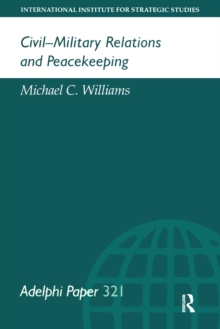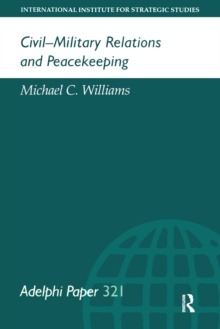
Political-Military Relations and the Stability of Arab Regimes Paperback / softback
by Risa Brooks
Part of the Adelphi series series
Paperback / softback
Description
Arab leaderships have been remarkably stable since the 1970s, particularly given the frequency of military coups in preceding years.
Nonetheless, the military remains a key force in most Arab states and political leaders must maintain its loyalty if they are to retain office.
Regimes have used a range of methods to ensure the military's backing: In Egypt, President Hosni Mubarak has maintained political control largely through providing the military with private and corporate benefits; selective appointments and institutional checks, are also useful instruments.
Tribal relations underpin King Hussein's political control in Jordan.
Transjordanians have not only been the main beneficiaries of political power, but have also occupied the key positions in the armed forces. In Syria, President Hafez al-Assad has built his regime on the Alawi minority, while the vast security apparatus limits the spread of sectarian, class or ideological grievances in the military. President Saddam Hussein has established multiple security agencies in Iraq designed to prevent conspiracies against his regime. Regular rotations and purges ensure that few officers are in place long enough to contemplate, let alone organise, a coup, while the severe punishments meted out to suspected plotters are a further disincentive to rebellion.
In this paper, Risa Brooks argues that the need for Arab regimes to maintain political control can undermine the combat potential of their armed forces.
Centralising command, creating overlapping commands, politicising selection criteria and authorising involvement in economic activities all potentially compromise military effectiveness. The fact that regimes have successfully managed political-military relations in the past does not mean that they will automatically do so in the future.
Changing social or economic conditions could upset the equilibrium in political-military relations.
Regime stability cannot therefore be taken for granted Transition to new leadership is a looming issue for the key regimes in Egypt, Syria and Jordan; political-military relations will play a crucial role in how it is resolved.
New leaders must gain and maintain social support if they are to consolidate power. The fact that so many Middle Eastern regimes face uncertain transitions raises the sobering prospect of profound instability and change in this strategically vital region. Maintaining political control is a continuous and evolving process.
A breakdown in social support for the leadership, failure to detect a conspiracy within the military and economic or political change that threatens military prerogatives could all disrupt political-military relations.
Current stability should not give rise to complacency.
Information
-
Out of stock
- Format:Paperback / softback
- Pages:120 pages
- Publisher:Thomson West
- Publication Date:01/12/1998
- Category:
- ISBN:9780199224203
Other Formats
- PDF from £20.69
- EPUB from £20.69
Information
-
Out of stock
- Format:Paperback / softback
- Pages:120 pages
- Publisher:Thomson West
- Publication Date:01/12/1998
- Category:
- ISBN:9780199224203










